Dalle isole inglesi alla storia di quattro nazioni. Una prospettiva comparata sulla storiografia nazionale in Gran Bretagna
DOI:
https://doi.org/10.15162/2282-5681/1567Parole chiave:
Storiografia nazionale, nation-building, Gran Bretagna, Inghilterra, Scozia, Galles, Irlanda del Nord, national history, Great Britain, England, Scotland, Wales, Northern IrelandAbstract
Questo articolo parte dalle lamentazioni di diversi storici inglesi per la crescente difficoltà di perpetuare una tradizione storiografica nazionale inglese e le contestualizzata nell’ambito di una più ampia critica del declino della storia nazionale, riscontrabile in tutta una serie di stati-nazione europei a partire dagli anni Ottanta. Viene quindi passata in rassegna l’evoluzione dall’Ottocento agli anni Sessanta di una grande narrazione storica trionfante, quella inglese/britannica, e il suo successivo venir meno. Successivamente, viene proposta una comparazione fra la decomposizione della grande narrazione storica inglese/britannica e le sorti delle grandi narrazioni storiche in altri Stati europei plurinazionali, e in particolare in Spagna, Belgio, Danimarca, URSS, Cecoslovacchia e Jugoslavia, mostrando come gli sviluppi storiografici in Gran Bretagna siano parte integrante di un più ampio trend storiografico europeo che si ritrova in diversi Stati plurinazionali. Infine, l’articolo cerca di rispondere alla domanda dove vada oggi la storiografia nazionale britannica.
This article begins by analyzing the lament expressed by several English historians about the growing difficulty of writing English national history, and it contextualizes this lament in a wider criticism of the decline of national history that could be found in a range of European nation states from the 1980s onwards. Subsequently, the article reviews the evolution of a triumphant English/British historical master narrative from the nineteenth century to the 1960s and its subsequent demise. A comparison is then drawn between the decomposition of the English/British historical master narrative with the fate of historical master narratives in other multi-national states in Europe, in particular Spain, Belgium, Denmark, the Soviet Union, Czechoslovakia and Yugoslavia, showing how the historiographical development in Britain is part and parcel of a wider historiographical trend in Europe that can be found in many multinational states. Finally, the article concludes by asking where British national history writing is heading.
Riferimenti bibliografici
AA. VV. (1993), Forever in the Shadow of Hitler? Original Documents of the Historikerstreit, the Con- troversy Concerning the Singularity of the Holocaust, Humanities Press, Atlantic Highlands NJ.
Barnett C. (1986), The Audit of War: The Illusion and Reality of Britain as a Great Nation, Macmillan, London.
Barnett C. (1995), The Lost Victory: British Dreams, British Reality 1945-1950, Macmillan, London.
Battente S. (2000), «Nation and State Building in Italy: Recent Historiographical Interpretations», Journal of Modern Italian Studies, n. 5, pp. 310-321.
Battente S. (2001), «Nation and State Building in Italy: Recent Historiographical Interpretations», Journal of Modern Italian Studies, n. 6, pp. 94-105.
Bentley M. (2011),The Life and Thought of Herbert Butterfield: History, Science and God, Cambridge University Press, Cambridge.
Berger S. (2005), «A Return to the National Paradigm? National History Writing in Germany, Italy, France and Britain from 1945 to the Present», The Journal of Modern History, n. 77, vol. 3, pp. 629-678.
Berger S. (2010), «Rising Like a Phoenix... The Renaissance of National History Writing in Germany and Britain since the 1980’s», in Berger S. – Lorenz C., 2010: pp. 426-451.
Berger S. – Lorenz C. (eds.) (2008), The Contested Nation: Ethnicity, Class, Religion and Gender in National Histories, Palgrave Macmillan, Basingstoke.
Berger S. – Lorenz C. (eds.) (2010), Nationalizing the Past: Historians as Nation Builders in Mod- ern Europe, Palgrave Macmillan, Basingstoke.
Biocca D. (1997), «Has the Nation Died? The Debate over Italy’s Identity (and Future)», Daedalus , n. 126, vol. 3, pp. 223-39.
Brunnbauer U. (ed.) (2004), (Re)Writing History: Historiography in Southeast Europe after Socialism, Lit Verlag, Münster.
Campos Matos S. – Mota Álvarez D. (2010), «Portuguese and Spanish Historiographies: Distance and Proximities», in Berger S. – Lorenz C., 2008: pp. 311-338.
Cannadine D. (1987), «British History: Past, Present – and Future?», Past and Present, n. CXVI, pp. 169-191.
Colley L. (1989), Lewis Namier, Weidenfeld & Nicolson, London.
Colley L. (1992), Britons. Forging the Nation 1707-1837, Yale University Press, New Haven CT-London.
Collini S. (1999), «Writing the ‘National History’: Trevelyan and After», in English Pasts. Essays in History and Culture, Oxford University Press, Oxford, pp. 9-37.
Coss P. R. – Lamont W. – Evans N. (1988), «British History: Past, Present - and Future?», Past and Present, n. CXIX, pp. 171-203.
Elkins C. (2005), Britain’s Gulag: the Brutal End of Empire in Kenya, Pimlico, London.
Elton G. R. (1968), The Future of the Past: An Inaugural Lecture, Cambridge University Press, Cambridge.
Elton G. R. (1977), «The Historian’s Social Function», Transactions of the Royal Historical Socie- ty, 5th series, n. 27, pp. 197-211.
Elton G. R. (1991), Return to Essentials. Some Reflections on the Present State of Historical Studies, Cambridge University Press, Cambridge.
Evans R. J. (1989), In Hitler’s Shadow: West German Historians and the Attempt to Escape from the Nazi Past, I.B. Tauris, London.
Ferguson N. (2004), Empire: The Rise and Demise of the British World Order and the Lessons for Global Power, Basic Books, New York.
Geyken F. (2003), «Angelsächsische Gründungsmythen und ihr Ein9 uß auf die englische Geschichtsschreibung des 18. Jahrhunderts», in Berger S. – Lambert P. – Schumann P. (eds.), Historikerdialoge: Geschichte, Mythos und Gedächtnis im deutsch-britischen kulturellen Austausch 1750-2000, Vandenhoeck & Ruprecht, Göttingen, pp. 219-234.
Hall C. (2000), «Introduction: Thinking the Empire, Thinking the Postcolonial», in Hall C. (ed.), Cultures of Empire: Colonizers in Britain and the Empire in the Nineteenth and Twentieth Centuries. A Reader, Manchester University Press, Manchester, pp. 1-36.
Hamburger J. (1976), Macaulay and the Whig Tradition, University of Chicago Press, Chicago. Hechter M. (1975), Internal Colonialism: The Celtic Fringe in British National Development, University of California Press, Berkeley CA.
Hernon J. M. jr (1976), «The Last Whig Historian and Consensus History: George Macau- lay Trevelyan», American Historical Review, n. 81, pp. 66–97.
Hofrichter A. (2008), Spanische Geschichtswissenschaft in den 1950er Jahren. Jaumes Vicens Vives und die Rezeption des esprit des Annales im Kontext der spanischen Forschung, Tesi di Laurea, Albert-Ludwigs-Universität Freiburg, Freiburg im Breisgau.
Jackson J. (1998), «Historians and the Nation in Contemporary France», in Berger S. – Do- novan M. – Passmore K. (eds.), Writing National Histories: Western Europe 1850 to the Present, Routledge, London, pp. 239-251.
Jones E. (2001), John Lingard and the Pursuit of Historical Truth, Sussex Academic Press, Brighton.
Kaiser W. – Krankenhagen S. – Poehls K. (2012), Europa ausstellen: das Museum als Praxisfeld der Europäisierung, Böhlau, Köln.
Kaye H. J. (1984), The British Marxist Historians, Polity Press, Cambridge.
Kearney H. (1989), The British Isles: A History of Four Nations, Cambridge University Press, Cambridge.
Keymeulen S. – Tollebeek J. (2011), Henri Pirenne, Historian: A Life in Pictures, Leuven University Press, Leuven.
Kováč D. (2011), «Slovakia, the Slovaks and their History», in Teich M. – Kováč D. – Brown M. D. (eds.), Slovakia in History, Cambridge University Press, Cambridge, pp. 1-14.
Leggewie C. (2011), Kampf um die europäische Erinnerung: ein Schlachtfeld wird besichtigt, C. H. Beck Verlag, München.
Lindner R. (1999), Historiker und Herrschaft. Nationsbildung und Geschichtspolitik in Weissrussland im 19. und 20. Jahrhundert, R. Oldenbourg Verlag, München.
Maier Ch. (1989), The Unmasterable Past. History, Holocaust and German National Identity, Harvard University Press, Cambridge MA.
Majumdar R. (2011), Writing Postcolonial History, Bloomsbury Academic, London.
Mandler P. (2002), History and National Life, Profile Books, London.
Marr A. (2011), The Diamond Queen, Macmillan, London.
Meriggi M. (1996), Breve storia dell’Italia settentrionale dall’Ottocento a oggi, Donzelli, Roma.
Mycock A. – Loskoutova M. (2010), «Nation, State and Empire: The Historiography of “High Imperialism” in the British and Russian Empires», in Berger S. – Lorenz C., 2010: pp. 233-258.
Nairn T. (1977), The Break-up of Britain: Crisis and Neonationalism, NLB, London.
Nora P. (éd.) (1984-1992), Les Lieux de mémoire, 7 voll., Gallimard, Paris.
Núñez-Seixas X. (1993), Historiographical Approaches to Nationalism in Spain, Breitenbach, Saarbrücken-Fort Lauderdale.
Oergel M. (1998), «The Redeeming Teuton: Nineteenth-Century Notions of the “German- ic” in England and Germany», in Cubitt G. (ed.), Imagining Nations, Manchester University Press, Manchester, pp. 75-91.
Østergård U. (2013), «Nation-Building and Nationalism in the Oldenburg Empire», in Berger S. – Miller A. (eds.), Nationalizing Empires, Central European University Press, Budapest, pp. 461-510.
Pasamar G. (2010), Apologia and Criticism: Historians and History of Spain 1500-2000, Peter Lang, Bern.
Patriarca S. (2001), «Italian Neopatriotism: Debating National Identity in the 1990s», Modern Italy, n. 6, pp. 21-34.
Pocock J. G. A. (1975), «British History: A Plea for a New Subject», Journal of Modern History, n. 47, pp. 601-28.
Pocock J. G. A. (2005), The Discovery of Islands, Cambridge University Press, Cambridge. Salinsky M. (2012), Writing British National History in the Twentieth Century, Tesi di dottorato, King’s College, London.
Samuel R. (1989), Patriotism: The Making and Unmaking of British National Identity, 3 voll., Routledge, London.
Samuel R. (1994), Theatres of Memory: Past and Present in Contemporary Culture, Verso, London. Samuel R. (1998), Island Stories: Unravelling Britain, Verso, London.
Schama S. (2000), A History of Britain, BBC Books, London.
Schöttler P. (2010), «After the Deluge: the Impact of the Two World Wars on the Histori- cal Work of Henri Pirenne and Marc Bloch», in Berger S. – Lorenz C., 2010: pp. 404- 425.
Siepmann M. (2012), «Das Haus der europäischen Geschichte: ein europäisches Museum- sprojekt», Geschichte in Wissenschaft und Unterricht, nn. 11-12, pp. 690-704.
Stapleton J. (2005), Sir Arthur Bryant and National History in Twentieth-Century Britain, Lexington Books, Oxford-Lanham MD.
Starkey D. (2001), «The English Historian’s Role and the Place of History in English Na- tional Life», The Historian, n. 71, pp. 6-15.
Suny R. G. (2001), «Constructing Primordialism: Old Histories for New Nations», The Journal of Modern History, n. 73, pp. 862-896.
Tollebeek J. (1998), «Historical Representation and the Nation State in Romantic Belgium (1830-1850)», Journal of the History of Ideas, n. 59, pp. 329-353.
Trevelyan L. (2006), A Very British Family: The Trevelyans and their World, I. B. Tauris, London.
Viroli M. (1995), Per amore della patria: patriottismo e nazionalismo nella storia, Laterza, Roma- Bari.
Zapponi N. (1994), «Fascism in Italian Historiography, 1986-1993: A Fading National Identity», Journal of Contemporary History, n. 29, vol. 4, pp. 547-68.
Downloads
Pubblicato
Fascicolo
Sezione
Licenza
Nazioni e regioni è una rivista open access che applica la licenza Creative Commons CC BY-NC-ND 4.0 a tutti i contenuti pubblicati.
Nazioni e regioni is an open-access journal that applies the Creative Commons CC BY-NC-ND 4.0 licence to all published contents.







